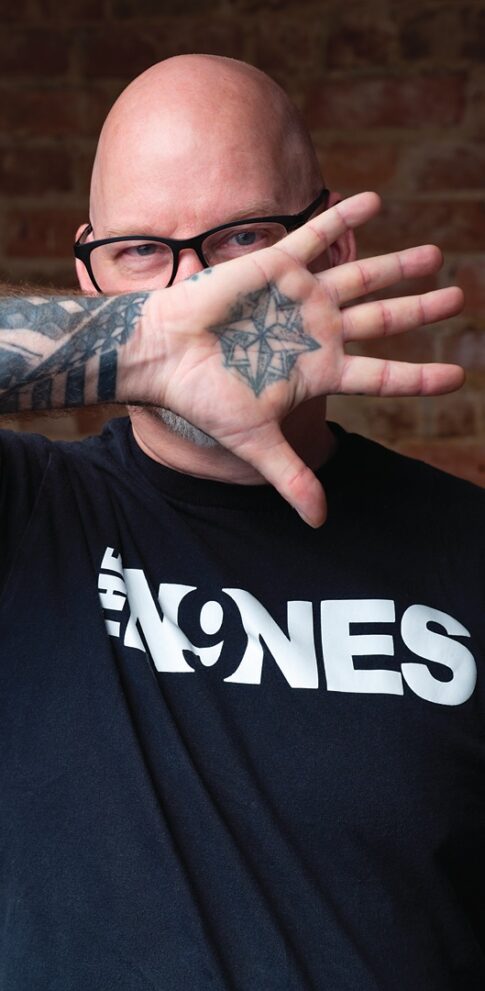
By Taylor Adams Cogan
Allen Falkner is not your average small business owner.
He’s the kind of man a lot of people know from varying circles of interest. Some know him from his years of work ridding their bodies of tattoos they don’t want – fading away unwanted memories or botched jobs, or making room for more art. Others know him as someone who reliably shows up to meetings for Deep Ellum. Some know him as the owner and operator of two destination bars on the east side of US Highway 75. In Dallas and beyond, Falkner’s famous for popularizing the art of suspension in North America.
Allen has managed to resist and push back when appropriate, lift up others (figuratively and literally), and provide spaces that add to the fabric of our communities.
How does one achieve that? Starting out as a punk on the streets of Deep Ellum in the 1980s helps.
Allen made his way from his stomping grounds of Lake Highlands to go to the Twilight Room – a downtown punk venue that was part of the original Deep Ellum before Interstate 345 – before making his way to find the rest of his scene.
“After Twilight Room, there was Clear View and Theater Gallery and Prophet Bar, which are more what we now consider proper Deep Ellum,” he says. “I started going in the mid-1980s. I’ve come back to Deep Ellum in phases: My youth, I spent time there, then California, went away, then came back as a younger adult, then other areas. Deep Ellum has been back and forth, as well.”
Allen’s business is the Nines, a 21-and-up venue and bar he opened in 2016 on Main Street near Malcolm X. Today, it’s the longest-standing dance club in Deep Ellum, but decades before that, he was taking in this neighborhood that had a different feel to it.
“When I first went to Deep Ellum, it was an underground scene: There wasn’t anything down there, just empty buildings. That’s when the artists went in and had, essentially, underground parties. They’d sell cheap beer, there were no liquor licenses,” he says. “That’s what it was like in the very, very beginning, then it slowly started gaining momentum.”
Deep Ellum had already had its own ups and downs since it was founded in 1873, and this point, more than a century later, was pivotal. Allen points to artist Frank Campagna for being a force in bringing artists back to the neighborhood. We then saw Adair’s Saloon bring its perfect little bar from Cedar Springs to Deep Ellum.
“It organically grew,” Allen says. “I watched it evolve.”
He was watching it as he went to shows there, as well as spending time on Lower Greenville. Being sober at the time, he wasn’t going to bars and drinking, but he was still going to the neighborhood for shows, for the venues that offered a small punk scene.
“I feel like somewhere around the early ‘90s it started to explode down there, venues opening left and right, multiple tattoo shops, artist showings, art exhibits,” he says.
Allen got into his own business in 1992, opening a piercing shop on Cedar Springs. He made his way around the city with operations in Oak Lawn, Lower Greenville, Addison, and in the late 1990s, Deep Ellum.
“It was dumb. That shop [Deep Ellum] did not last very long, and there’s a lot to that,” he says. “It just didn’t work out; that was my first foray into being a business owner down there.”
Fast-forward to 2014, and he and his partners opened Red Light Lounge, which later became the Nines, which was managed by Corey Howe.
For years, Allen had talked with Don Nedler of Lizard Lounge and It’ll Do, about opening a nightclub together. The connection isn’t surprising: Lizard Lounge was home to the weekly Church. A 2016 Observer article digs into some of that scene.
“One day, I was like, ‘All right,’” Allen says. “It was him and me and three other people – it was basically kind of a midlife crisis. I did not expect to be in the bar business at all.”
At that point, Allen had been focused on his piercing shops for 15 years and was thriving in his tattoo removal business, including Fade Fast in Deep Ellum, which he sold in 2022. But, he did really love what the bar business offered.
“I wanted to leave the tattoo removal business: It hurt. We sold something that people loved, and when someone got a tattoo or piercing, they were extremely happy when they left. When I got into the removal business, it was all regret.”
Some of that regret manifested itself in powerful ways.
“The example I give to people is that I did a whole lot of pro bono work where I took tattoos off human trafficking survivors. There’s nothing worse than removing a rapist’s name off of them,” Allen says. “But the bar business, OK, we’re selling fun. It’s its own animal.
“I run adult daycares. You get drinks into people, they lose their inhibitions, their intelligence, sometimes, the best, sometimes the worst, sometimes a little bit of both.”
Allen’s not usually the one shaking a cocktail behind the bar. He’s there in the daytime, paying bills, dealing with bank deposits, permits, vendors, and repair people.
Allen also has Charlie’s Star Lounge in Old East Dallas, a laidback bar that’s a neighborhood favorite and a success thanks to Falkner’s partnership with Howe. It’s a different scene from the Nines, but still one for good drinks and community. He has a viewpoint that not all business owners do: similar and different businesses across varying Dallas neighborhoods.
Falkner is a common face in the community, where he also met his wife, Courtney – the two at Lizard Lounge in 2007, where she was performing for a show (she’s known internationally in her own right for Fetishball).
Allen’s passion is shared by plenty of business owners, though, in encouraging residents and visitors to support local businesses.
One thing he’d like to see, for both Deep Ellum and the city, is more walkable spaces.
“It would be great if Dallas could become a walkable city,” he says. “I think the planners and the property owners have this idea that Deep Ellum is walkable, but it’s not true.
“This is right in a way: It’s easy to get from place to place in the neighborhood on foot. But that’s after you’re already there.”
If people got to the neighborhood in ways other than their cars, he says, we’d see a less car-congested space where people felt even safer to walk around.
For now, Allen continues to show up, whether that’s encouraging more people to show up on Main Street, being a regular face at a public safety meeting, or posting on social media about the good and bad of running a destination spot.
“I have faith,” he says. “I think Deep Ellum will go through its ebb and flow and get it figured out.”
